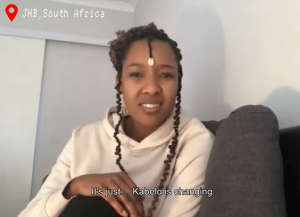COVID-19 lockdown has forced us to stay within the confines of our homes. While this may seem exciting at first, it is quite easy to get bored and frustrated. Some people are keeping sane with exercise, meditation, and cooking.
My personal favourite? Binge-watching MTVShuga and chatting with the producers. The show’s characters are much like the ones in our lives: Nomalanga is that aunt we all have that can get strict at times but at the end, we know it’s coming from a place of love; Diana is that bully in our secondary school we were afraid of standing up against; Ipeleng is that older sister we have who treats us like her children.
While many TV shows shy away from portraying the not-so-pretty aspects of our lives, MTV Shuga offers us a mirror. It is no secret that many cases of domestic and sexual violence take place at home and are perpetrated by the same people who are supposed to protect us; this, too, is highlighted on the show. We have seen Sol’s mother, Zamo and Faa in abusive relationships and in the most recent season, MTVShuga Alone Together, we see Dineo in a violent and controlling relationship. This storyline is even more relevant now. While staying home is non-negotiable, there have been reports of a rise in domestic violence during this lockdown period.
The statistics are high but there is help available. There are many organizations that are fighting against domestic and sexual violence, providing legal and medical services for survivors and hotlines for depressed and suicidal people. Please reach out to them via the numbers here.
Apart from reaching out to professionals, there are other options of staying safe. First, you should tell someone you trust. This can be a family member, a friend or a neighbour. You can also come up with coded messages with someone who lives close by; for example, “can I have more salt?” or “you should water your plants today.” These messages are simple non-detectable messages that can translate to “I’m in trouble”, “I need help” or “I don’t feel safe” for the people in the know.
Second, you should keep a record. Get a diary, a journal or write in your phone’s notepad. Make sure the option you choose is not accessible to your abuser; if he checks your phone regularly, do not keep evidence there (this may lead to more abuse). In whichever medium you use, write about the abusive incidents as explicitly as you can – Who did it? What happened? When? Why? Where? How did it make you feel? If there is evidence of abuse – a broken nose, a medical record, a picture, blood stain on clothing, etc – save it. It can be used as evidence later. But don’t keep the evidence where your abuser might find them.
Third, you should aim to be financially independent. Start putting some money aside, in case you might need to run away. Ask friends and family so you can gather as much as you can. If possible, don’t tell your abuser about this.
Most importantly, do not be afraid to seek help. Reach out to someone who can help you – a family member, a friend, an organization, the police, etc.
Stay safe fam!

